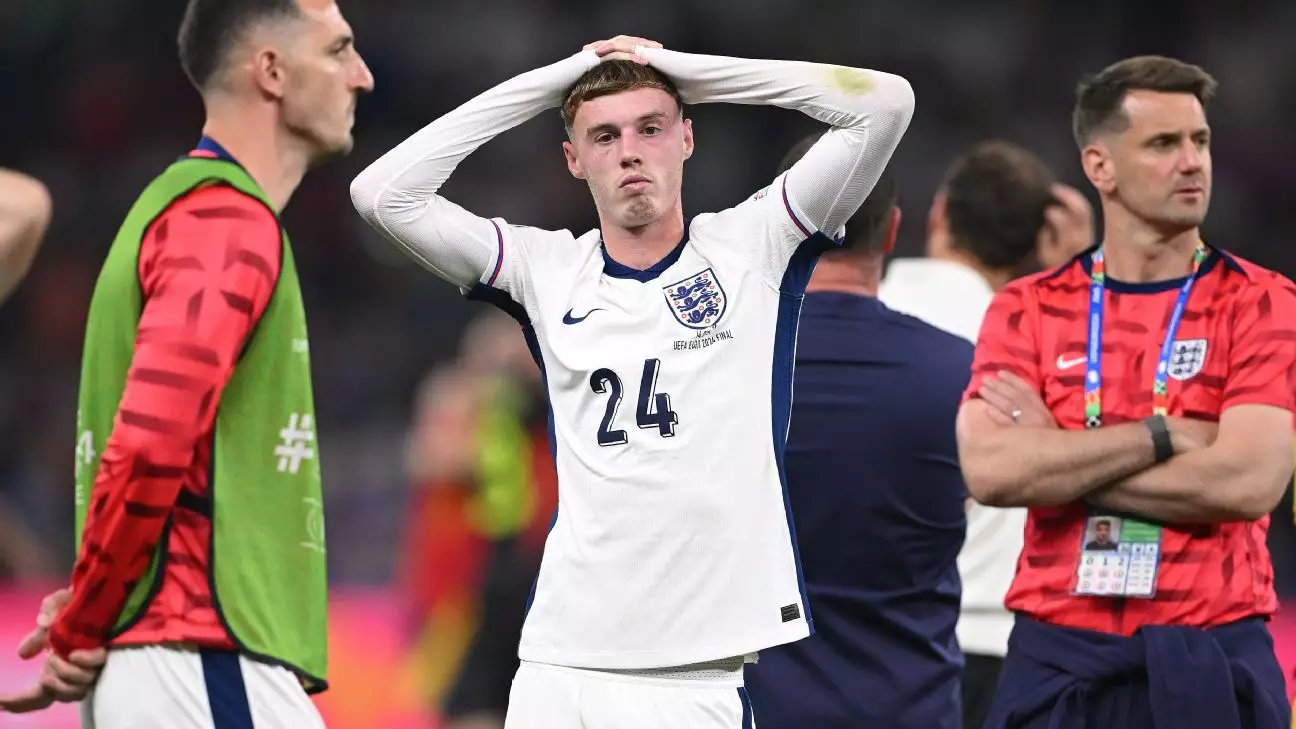As the world watched the exhilarating journey of the England national team during Euro 2024, one player’s journey was anything but smooth. Cole Palmer, a young and talented midfielder, recently expressed his disappointments regarding the opportunities afforded to him by former head coach Gareth Southgate. Despite an impressive season at Chelsea, where Palmer netted 25 goals in various competitions after moving from Manchester City, he found himself on the sidelines for most of the tournament. This situation raises important questions about talent utilization and the dynamics within national teams.
Southgate’s decision not to start Palmer throughout the tournament sparked considerable frustration for the Player. Palmer’s reflections revealed a deeper sentiment; when confronted with struggling performances from the team, his absence from the pitch felt increasingly unjustifiable. It seemed peculiar that someone in top form wasn’t granted the chance to contribute meaningfully during crucial moments. His desire to influence the game was palpable; “If you bring me on [in] the third game and I don’t do anything, then I can’t really say anything. I just had to try and force my way in,” he remarked, illustrating a sentiment of determination mixed with bewilderment.
The situation underscores a common conflict within sports: the gap between personal aspirations and team dynamics. Palmer, who had made a name for himself with Chelsea post-transfer, grappled with the feeling that the immense effort he exerted in club football was not being recognized at the international level. This discrepancy poses a critical dilemma for athletes—navigating the expectations set by coaches while striving to showcase their talents effectively.
While Palmer’s sentiment underscores ambition, it also highlights a broader narrative about competition in sports. Players are continually vying for positions, and emerging talents must anxiously await their turn. However, the nature of international tournaments often compresses time and opportunities. Southgate’s slew of experienced players had their footing, making it difficult for newcomers to break through—a reality that Palmer was painfully aware of.
In various matches this summer, Southgate opted to use Palmer as an impact substitute, a role characterized by limited playtime but great potential for influence. This can be a double-edged sword; while he managed to assist in a crucial semifinal goal against the Netherlands and scored during the final against Spain, limited opportunities often lead to underappreciated contributions. Players in such roles can find themselves in a continuous cycle of wanting to do more yet being restricted by strategic decisions.
Palmer’s comment regarding wondering why he wasn’t given the same chances as other substitutes encapsulates the inner competition within the squad. Competitors naturally desire recognition, especially when they are in peak form. Palmer’s introspection on watching others seize opportunities adds layers to the narrative of a young athlete’s journey, emphasizing both jealousy and motivation.
The Impacts of Transfers on Player Development
Transitioning between clubs can redefine players’ careers. Palmer’s move from Manchester City to Chelsea for approximately £42.5 million was a significant step, reflecting both Chelsea’s trust in his abilities and Palmer’s determination to play more regularly. Pep Guardiola’s acknowledgment that Palmer had sought more first-team opportunities for two seasons signals the delicate balance players must maintain between ambition and the reality of competitive situations.
The passion for the game often drives players to seek solutions, and Palmer’s departure to Chelsea enabled him to reclaim his path. However, even with a successful start in Chelsea colours, the question remains about how quickly he can translate that form into international play. Such transitions can be disruptive, yet they can also invigorate a player’s career if managed well.
Currently, Palmer finds himself facing another hurdle as injuries have sidelined several top players from the England national squad. His path to regular appearances may once again be obstructed. This juncture not only highlights his desire to be featured more prominently but also the ongoing challenges faced by rising stars in maintaining their momentum.
Cole Palmer’s journey is a compelling exploration of frustration, ambition, and the pursuit of recognition within the sporting arena. As he navigates these challenges, his resilience will likely be key to his future success, whether it be on club fields or national stages. As he continues to develop, supporters and analysts alike will be watching closely to see how he overcomes these obstacles in the ever-competitive landscape of football.

